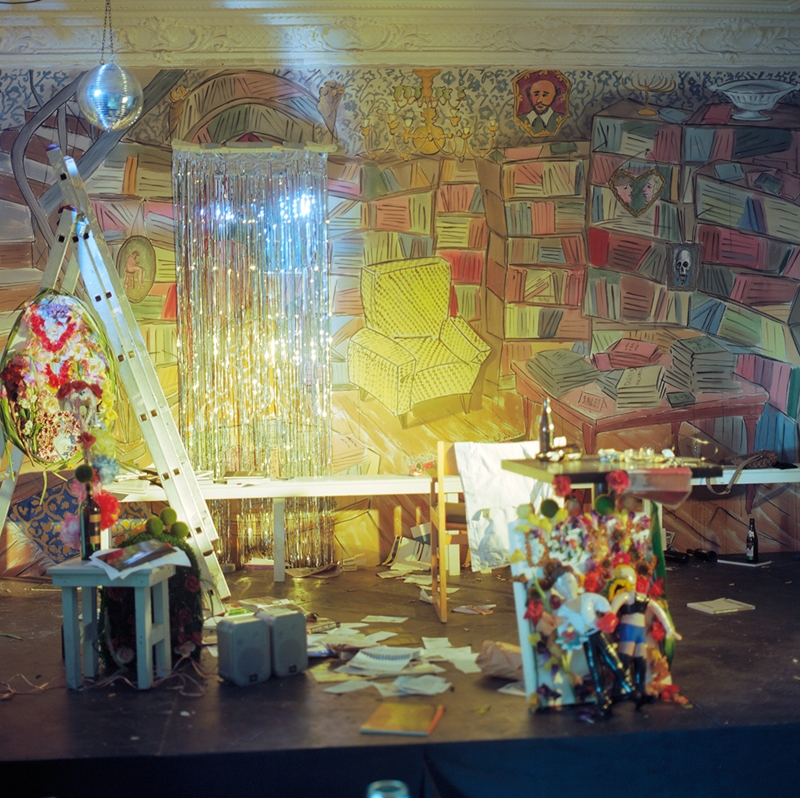Berlin’s Kreuzberg is similar to New York’s Lower East Side or London’s Hackney in that they all house avant-gardes of the recent past. These locales once provided a low-cost alternative to the Mittes, Chelseas and Mayfairs of the West, but have now become subsumed by gentrification and overcrowded, as trailblazers venture elsewhere.
Calla Henkel and Max Pitegoff started the Kreuzberg outpost New Theater in August 2013, after a successful stint as bar owners in the adjacent neighbourhood Neukölln. Unlike Times, their previous bar effort owned with artist Lindsay Lawson, New Theater is a proper theatre that stages infrequent, intimately scaled but wildly inventive amateur plays. These plays feature a rotating cast of friends filling several roles, from acting and set and prop design to scriptwriting. The resulting plays, which often centre on a social space such as a restaurant or bar, are as goofy and endearing as they are incisive, and sometimes feel like a very sophisticated artworld version of dress-up. Apartment (2014), for example, found a gaggle of artists living in postapocalyptic New York running a ramen noodle shop, with a wardrobe by up-and-coming designer Nhu Duong. Hotel Moon, New Theater’s first musical, opens next, featuring a libretto written by Henkel, Pitegoff and writer Pablo Larios, with music direction by crooner Dan Bodan and Trevor Lee Larson. Like so many New Theater plays, the cast for Hotel Moon could double as an emerging-talent search, and includes artists such as Amelie von Wulffen, Grayson Revoir and Simon Denny.
Opening in a central area like Kreuzberg was tactical on Henkel and Pitegoff’s part, as they knew their ragtag theatre was out-of-the-box and not sure to bring in a crowd. Two years later, New Theater has become so successful – drawing in visitors ranging from greasy-haired Neukölln artists to artworld notables such as Josephine Pryde or new Stedelijk Museum chief curator Bart van der Heide – that the shows either immediately sell out or are completely packed. They’ll close in June of this year, citing a strained relationship with their landlord, who was initially reluctant to give them a two-year lease in such a rapidly gentrifying neighbourhood. Henkel and Pitegoff are also artists, primarily photographers, in their mid-twenties, whose likely-not-incredible income funds New Theater. Because it’s not a nonprofit and receives no state funding, New Theater is totally autonomous and quickmoving – but the payoff is destitution. Henkel and Pitegoff clearly pour every ounce of their energy and resources into this project, while maintaining separate artistic practices. When I asked how New Theater and their artistic practice is connected in a recent phone interview, Henkel said, “We’re interested in working with other people in our artistic practices, and photographing performance, so there are threads of similarity.”
Thinking about collaboration, documentation and audience is what initially brought Henkel and Pitegoff to the structure of theatre. “We’ve always been involved with performance, and questioning how to use the space of an institution. In these types of spaces you really have to beg for audience. The audience has to be converted by the performance itself to really watch,” say Henkel and Pitegoff, oftentimes respectfully finishing each other’s sentences. (Audience conversion is an unfortunate truth. The attention span of most people, myself at times included, for performance and video in museums and galleries is no more than one minute.) Henkel and Pitegoff continue, “We were also thinking about what it means to work with so many people, and so the structure and hierarchy of theatre made a lot of sense for us.”
And they do work with so many people, many of them friends and their lovers, former lovers that have become friends and the whole range of permutations of acquaintanceship that makes up a social circle. In fact, I was at a dinner party in Kreuzberg last summer and spoke most of the night to a man I thought I had surely befriended in New York, but whose name escaped me. It turns out I had never met him, just started talking to him, having seen him a few weeks earlier acting as the narrator of a New Theater performance. Oops.
This intimately scaled level of celebrity is an uncanny thing. I remember now looking at him and others I vaguely recognised from around Berlin, wondering – worrying – if they’d remember their lines. “I think it’s a weird space where you’re allowed to stare at your friends or people you know onstage,” says Henkel. “There’s a type of embarrassment you have I think that’s a really helpful emotion. This fear that you have, it’s a really deep love when you see someone onstage and feel afraid for them and it makes you connect in this bizarre, fucked-up way. I think this generosity happens more in this space where people don’t really know what they’re doing.”
After New Theater closes in June, Henkel and Pitegoff have no immediate plans to reopen – at least not in Kreuzberg. So catch them while you can.
This article was first published in the April 2015 issue.
